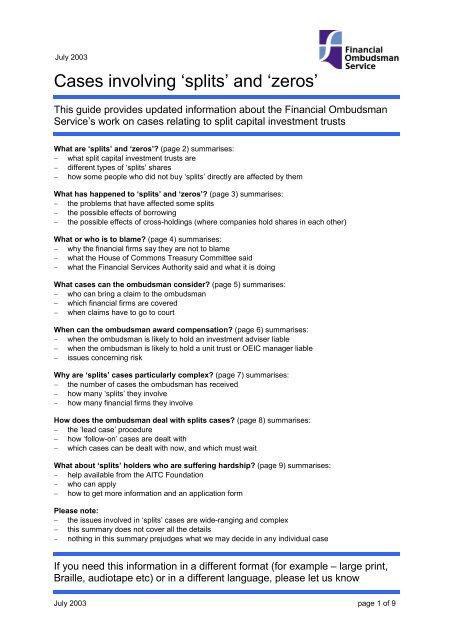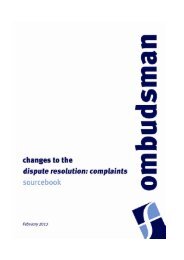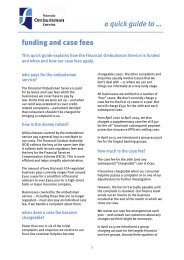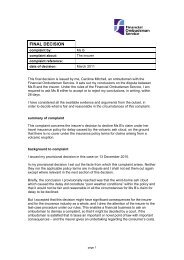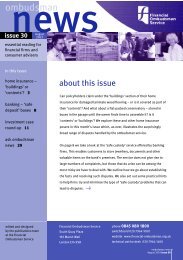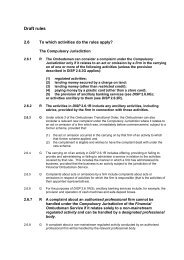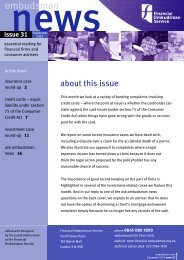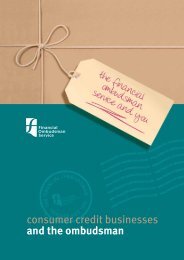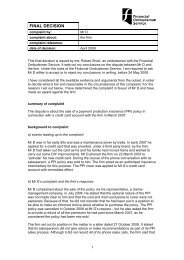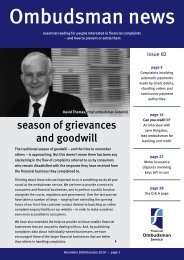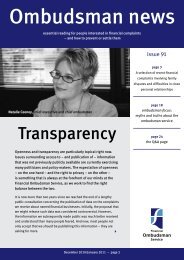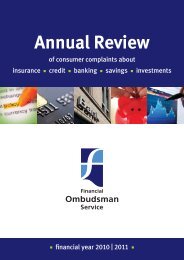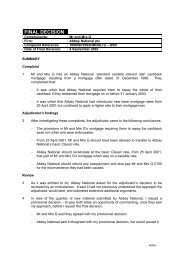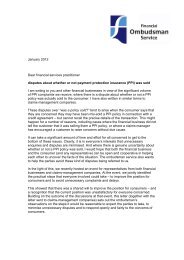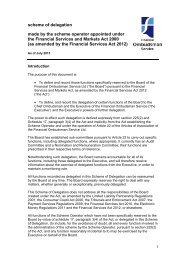cases involving 'splits' and 'zeros' - Financial Ombudsman Service
cases involving 'splits' and 'zeros' - Financial Ombudsman Service
cases involving 'splits' and 'zeros' - Financial Ombudsman Service
You also want an ePaper? Increase the reach of your titles
YUMPU automatically turns print PDFs into web optimized ePapers that Google loves.
July 2003<br />
Cases <strong>involving</strong> ‘splits’ <strong>and</strong> ‘zeros’<br />
This guide provides updated information about the <strong>Financial</strong> <strong>Ombudsman</strong><br />
<strong>Service</strong>’s work on <strong>cases</strong> relating to split capital investment trusts<br />
What are ‘splits’ <strong>and</strong> ‘zeros’ (page 2) summarises:<br />
what split capital investment trusts are<br />
different types of ‘splits’ shares<br />
how some people who did not buy ‘splits’ directly are affected by them<br />
What has happened to ‘splits’ <strong>and</strong> ‘zeros’ (page 3) summarises:<br />
the problems that have affected some splits<br />
the possible effects of borrowing<br />
the possible effects of cross-holdings (where companies hold shares in each other)<br />
What or who is to blame (page 4) summarises:<br />
why the financial firms say they are not to blame<br />
what the House of Commons Treasury Committee said<br />
what the <strong>Financial</strong> <strong>Service</strong>s Authority said <strong>and</strong> what it is doing<br />
What <strong>cases</strong> can the ombudsman consider (page 5) summarises:<br />
who can bring a claim to the ombudsman<br />
which financial firms are covered<br />
when claims have to go to court<br />
When can the ombudsman award compensation (page 6) summarises:<br />
when the ombudsman is likely to hold an investment adviser liable<br />
when the ombudsman is likely to hold a unit trust or OEIC manager liable<br />
issues concerning risk<br />
Why are ‘splits’ <strong>cases</strong> particularly complex (page 7) summarises:<br />
the number of <strong>cases</strong> the ombudsman has received<br />
how many ‘splits’ they involve<br />
how many financial firms they involve<br />
How does the ombudsman deal with splits <strong>cases</strong> (page 8) summarises:<br />
the ‘lead case’ procedure<br />
how ‘follow-on’ <strong>cases</strong> are dealt with<br />
which <strong>cases</strong> can be dealt with now, <strong>and</strong> which must wait<br />
What about ‘splits’ holders who are suffering hardship (page 9) summarises:<br />
help available from the AITC Foundation<br />
who can apply<br />
how to get more information <strong>and</strong> an application form<br />
Please note:<br />
the issues involved in ‘splits’ <strong>cases</strong> are wide-ranging <strong>and</strong> complex<br />
this summary does not cover all the details<br />
nothing in this summary prejudges what we may decide in any individual case<br />
If you need this information in a different format (for example – large print,<br />
Braille, audiotape etc) or in a different language, please let us know<br />
July 2003 page 1 of 9
What are ‘splits’ <strong>and</strong> ‘zeros’<br />
‘Splits’ are a special type of investment trust company. ‘Zeros’ are a special type of ‘splits’ share.<br />
What is an ‘investment trust company’<br />
It is a company listed on the stock exchange. Its business is to invest in other companies. Buying<br />
shares in an investment trust company is a way of investing in a spread of other companies. There<br />
have been investment trust companies for more than 100 years.<br />
What is special about a ‘split capital’ investment trust company<br />
A ‘splits’ company is an investment trust company that has different types of share, giving different<br />
rights to the shareholders. There have been ‘splits’ companies for more than 100 years; though ‘zero’<br />
shares first appeared in 1987.<br />
What different types of share are there<br />
That depends on the set-up of the particular ‘splits’ company. Most of the complaints we have<br />
received relate either to zero dividend preference shares (‘zeros’) or to income shares – though ‘splits’<br />
companies usually have capital, or ordinary, shares as well.<br />
What are ‘zero dividend preference shares’<br />
‘Zero dividend’ means they produce no income. ‘Preference’ means they come before any other<br />
shares when the company’s capital is shared out. They are intended to pay out a specified amount of<br />
capital at a specified date, provided the company has enough assets.<br />
What are ‘income shares’<br />
As their name indicates, they produce income. Some are entitled to a share of any capital that is left<br />
over when all the ‘zeros’ have been paid out. Others are not entitled to any of the capital.<br />
But I didn’t invest in a ‘splits’ company!<br />
Some of the <strong>cases</strong> we are dealing with concern people who bought ‘splits’ shares directly. But some<br />
concern people who bought an investment that put its money wholly or mainly in ‘splits’, <strong>and</strong> whose<br />
value is affected by the value of the ‘splits’ it invested in.<br />
How could I have invested indirectly in ‘splits’<br />
Various investments could have been based wholly or mainly on ‘splits’ – for example, units in a unit<br />
trust, shares in an open-ended investment company (OEIC), shares in an ‘ordinary’ investment trust<br />
company, a personal equity plan (PEP) or an individual savings account (ISA).<br />
July 2003 page 2 of 9
What has happened to ‘splits’ <strong>and</strong> ‘zeros’<br />
Some ‘splits’ companies are in financial difficulties. In the worst <strong>cases</strong>, share dealings have been<br />
suspended or liquidators appointed.<br />
Are there problems with all ‘splits’ companies<br />
Because the stock market generally has fallen, many shares <strong>and</strong> investments have reduced in value.<br />
But not all ‘splits’ companies are in financial difficulties. The main problems relate to a limited number<br />
of them.<br />
What has gone wrong with some ‘splits’ companies<br />
Their assets have fallen in value drastically, <strong>and</strong> by much more than the stock market generally. So<br />
there is not enough money to pay dividends on the income shares, there may not be enough assets to<br />
repay the capital on the ‘zeros’ <strong>and</strong> other capital shares are likely to get nothing.<br />
Why did it happen<br />
They have all been affected by the fall in the stock market. But some have suffered from the effect of<br />
borrowing, cross-holdings in other ‘splits’ companies or both of these.<br />
Why did they borrow<br />
A ‘splits’ company invests in other companies’ shares. If it borrows, it can buy more shares. If those<br />
shares produce income (<strong>and</strong>/or growth in value) greater than the interest on the borrowing, the ‘splits’<br />
company produces more for its income shareholders (<strong>and</strong>/or its ‘zero’ <strong>and</strong> other capital shareholders).<br />
How can that cause a problem<br />
If those shares produce income that is less than the interest on the borrowing – or if the value of the<br />
shares falls, as many shares have done – the ‘splits’ company loses money for its shareholders. And<br />
the terms of the borrowing may require it to sell shares.<br />
Why would the terms of the borrowing require it to sell shares<br />
The terms of the loan may say, for example, that the loan must not exceed half the value of the ’splits’<br />
company’s assets. If the ‘splits’ company loses money, the value of its assets may reduce to a point<br />
where it has to repay some of the borrowing – by selling shares it has invested in.<br />
Does that mean a ‘splits’ company shouldn’t borrow<br />
It is all a question of what is prudent in the circumstances, taking a realistic view of the benefits <strong>and</strong><br />
the level of risk the shareholders were led to expect. And, if a ‘splits’ company does borrow, not<br />
borrowing too much in relation to its assets <strong>and</strong> its ability to repay.<br />
Why would any company take such a risk<br />
Many house buyers do something very similar. They take out a mortgage to buy a house more<br />
expensive than they could buy for cash, expecting the increase in value will outstrip the cost of the<br />
loan. But it can go wrong if house prices fall.<br />
What about cross-holdings<br />
Some ‘splits’ companies invested in one another’s shares. As with borrowing, this might increase the<br />
benefits if everything is going well – but it might increase the dangers if things go badly <strong>and</strong> ‘splits’<br />
companies start to bring each other down.<br />
July 2003 page 3 of 9
What or who is to blame<br />
That depends on whom you listen to. Some financial firms blame an ‘unprecedented’ fall in the stock<br />
market. Many investors say that fall merely exposed problems that already existed.<br />
What do some financial firms say<br />
They say: They sold the shares in good faith. No ‘splits’ company had failed in the past. No ‘splits’<br />
company had failed to pay out its ‘zeros’ in full. Present problems arise from a stock-market fall<br />
greater, <strong>and</strong> longer, than could reasonably have been predicted.<br />
But didn’t the House of Commons Treasury Committee criticise ‘splits’<br />
The Committee’s conclusions included: Many of the ‘splits’ companies launched in the late 1990s<br />
were structured in such a way that, in adverse market conditions, the ‘zeros’ were not low risk. Even<br />
those who designed them did not fully underst<strong>and</strong> how they would react in falling markets.<br />
Where does the <strong>Financial</strong> <strong>Service</strong>s Authority come in<br />
The financial regulator, the <strong>Financial</strong> <strong>Service</strong>s Authority (FSA), does not have power to regulate ‘splits’<br />
companies. But it does regulate the financial firms that advised people to buy ‘splits’ shares, as well as<br />
the financial firms that manage investments for ‘splits’ companies.<br />
What did the FSA say<br />
It said that some ‘splits’ companies had problems, from borrowings <strong>and</strong>/or cross-holdings, which were<br />
there already – but became apparent when the stock market fell.<br />
What is the FSA doing<br />
It has announced that it is investigating the ‘splits’ marketing material produced by some financial<br />
firms, to see if it explained the risks appropriately – <strong>and</strong> it is investigating whether there was any<br />
collusion among a ‘magic circle’ of some firms.<br />
Where is the FSA up to with its investigations<br />
The FSA is acting in the role of ‘policeman’. It has to follow stringent procedural rules, <strong>and</strong> it cannot<br />
tell the <strong>Financial</strong> <strong>Ombudsman</strong> <strong>Service</strong> precisely what it is doing <strong>and</strong> what it might or might not<br />
have discovered.<br />
When will we know the results of the FSA’s investigations<br />
It could all take a long time. We are currently proceeding on the basis that we will need to decide<br />
most ‘splits’ <strong>cases</strong> before the FSA’s investigations are completed – though some ‘splits’ <strong>cases</strong> may<br />
turn on general issues, where fairness may require us to await interim developments.<br />
What if the FSA’s investigation turns up evidence<br />
We might reopen a case where there is fresh evidence about the firm complained against. But, for<br />
example, proof of secret wrongdoing by a ‘splits’ manager would not justify reopening a case against<br />
an independent financial adviser who could not have been expected to know about it.<br />
Can the FSA make a financial firm pay compensation<br />
The FSA does not deal with individual <strong>cases</strong>. That is the <strong>Financial</strong> <strong>Ombudsman</strong> <strong>Service</strong>’s role. But, if<br />
the FSA’s investigation proves general wrongdoing by a particular financial firm, the FSA may be able<br />
to make the firm sort out the problems it caused.<br />
July 2003 page 4 of 9
What <strong>cases</strong> can the ombudsman consider<br />
Unlike the courts, there are limits on the financial firms we cover <strong>and</strong> on who can bring <strong>cases</strong> to us.<br />
What is the <strong>Financial</strong> <strong>Ombudsman</strong> <strong>Service</strong><br />
We were established by law, as an alternative to the civil courts, to resolve individual financial services<br />
complaints. We do not control the extent of our jurisdiction – including the firms <strong>and</strong> customers we<br />
cover. We have no power to make rules for financial firms. That is for Parliament <strong>and</strong> the FSA.<br />
What financial firms does the ombudsman cover<br />
Broadly, the <strong>Financial</strong> <strong>Ombudsman</strong> <strong>Service</strong> has jurisdiction to deal with complaints against financial<br />
firms that are now regulated by the FSA – including financial firms that advised people to buy<br />
‘splits’ shares.<br />
Who can bring a ‘splits’ complaint against a particular firm to the ombudsman<br />
We can consider complaints where the complainant was a customer of the particular firm complained<br />
against. The complainant might be a customer as a result of the firm advising on the purchase of<br />
‘splits’ shares, arranging the purchase or selling them the ‘splits’ shares.<br />
Who else can bring a ‘splits’ complaint to the ombudsman<br />
We can also consider complaints where the complainant held units in a unit trust, or shares in<br />
an open-ended investment company (OEIC), that was managed by the particular financial firm<br />
complained against.<br />
Can the ombudsman consider a complaint against a ‘splits’ company<br />
As previously explained, the ‘splits’ companies themselves are not regulated by the FSA. So the<br />
<strong>Financial</strong> <strong>Ombudsman</strong> <strong>Service</strong> has no jurisdiction to deal with complaints against these companies.<br />
Can the ombudsman consider complaints against a ‘splits’ manager<br />
We have no power to consider complaints about what a financial firm did in its capacity as manager of<br />
the investments in a ‘splits’ company – because the ‘splits’ manager’s customer was the ‘splits’<br />
company, not its shareholders.<br />
Who can deal with a claim against a ‘splits’ company or ‘splits’ manager<br />
Only the courts have power to deal with claims against the ‘splits’ company, or claims about what a<br />
financial firm did as manager of the investments in a ‘splits’ company. The ombudsman has no power<br />
to give legal advice about the prospects of such claims.<br />
Can the ombudsman consider complaints about a ‘splits’ company’s prospectus<br />
The prospectus was issued, under stock exchange rules, when the ‘splits’ shares were launched.<br />
We do not have power to consider complaints about it.<br />
Can the ombudsman consider complaints about ‘splits’ marketing material<br />
It depends on the relationship between the complainant <strong>and</strong> the firm that issued the marketing<br />
material. We can only deal with such complaints if the complainant was, or became, the firm’s<br />
customer – or if the customer bought units in a unit trust, or shares in an open-ended investment<br />
company (OEIC), managed by the firm.<br />
July 2003 page 5 of 9
When can the ombudsman award compensation<br />
Where the complainant <strong>and</strong> the financial firm are covered by our jurisdiction, we can award<br />
compensation of up to £100,000 – if the financial firm was to blame.<br />
When will the ombudsman hold the financial firm liable<br />
Broadly, the ombudsman will hold the financial firm liable if it advised a customer to buy ‘splits’ shares<br />
when they were ‘unsuitable’ for the customer – or if the financial firm misled a customer into buying<br />
‘splits’ shares through it or from it.<br />
What about holdings in unit trusts or open-ended investment companies (OEICs)<br />
Broadly, the ombudsman will hold the financial firm that managed the unit trust or OEIC liable if it<br />
bought ‘splits’ shares for the unit trust or OEIC inappropriately – or if the financial firm misled a<br />
customer into buying a holding in the unit trust or OEIC.<br />
Why might ‘splits’ shares have been ‘unsuitable’ for a customer<br />
In considering suitability, we have to consider the investor’s circumstances, the purpose of the<br />
investment <strong>and</strong> the appropriate balance between the return the investor needed <strong>and</strong> the risk the<br />
investor could afford to take.<br />
Didn’t the Treasury Committee say that some ‘splits’ shares were too risky<br />
The Committee took evidence from only three financial firms – one of the institutions that launched a<br />
large number of ‘splits’ companies, <strong>and</strong> two brokers. It dealt with general issues <strong>and</strong> did not make<br />
specific judgements about individual ‘splits’ companies.<br />
Doesn’t the drastic fall in value prove that ‘splits’ shares were too risky<br />
Any investment can go down as well as up. Many types of investment went down as the stock market<br />
fell. We must avoid judging with the benefit of hindsight. What matters is what the financial firm<br />
complained against knew, or should have known, about the risk of the particular ‘splits’ company at<br />
the time.<br />
July 2003 page 6 of 9
Why are ‘splits’ <strong>cases</strong> particularly complex<br />
‘Splits’ companies are structured in a complicated way. And we have received <strong>cases</strong> concerning many<br />
different ones, <strong>involving</strong> a multiplicity of financial firms.<br />
How many ‘splits’ companies is the ombudsman looking at<br />
We have <strong>cases</strong> concerning ‘splits’ companies launched by 29 different financial institutions. Most of<br />
these organisations sponsored a number of individual ‘splits’ companies – 11 of them in one case.<br />
We have to look at each of the many ‘splits’ companies separately.<br />
Aren’t all ‘splits’ companies roughly the same<br />
Only some ‘splits’ companies are in financial difficulties. The share structure varies from one to<br />
another. Whether there are borrowings <strong>and</strong>/or cross-holdings (<strong>and</strong> the extent of these) varies from<br />
one to another – <strong>and</strong> also over time. So we have to look at each ‘split’, <strong>and</strong> each period, individually.<br />
How many ‘splits’ <strong>cases</strong> has the ombudsman received<br />
We have received more than 3,600 such <strong>cases</strong> so far. These involve a large number of different<br />
‘splits’ companies, relating to different periods. They also involve claims against almost 500 different<br />
financial firms.<br />
Why are so many financial firms involved<br />
Some complainants bought ‘splits’ shares, as single holdings or part of a portfolio. Some acquired an<br />
indirect interest in ‘splits’ through a unit trust, an open-ended investment company (OEIC), an<br />
‘ordinary’ investment trust company, a personal equity plan (PEP) or an individual savings<br />
account (ISA).<br />
What roles did the firms play<br />
Some advised. Some arranged. Some managed – a portfolio, a unit trust, an OEIC, a PEP or an ISA.<br />
One transaction could involve, for example, firm A advising the purchase of an ISA managed by firm B<br />
<strong>and</strong> invested in a unit trust managed by firm C that invested in ‘splits’ managed by firms D, E <strong>and</strong> F.<br />
What rules did the firms have to follow<br />
FSA regulation of investment firms only started on 1 December 2001. Before that, different types of firm<br />
were regulated (under differing rulebooks) by IMRO (the Investment Management Regulatory<br />
Organisation), PIA (the Personal Investment Authority) <strong>and</strong> SFA (the Securities <strong>and</strong> Futures Authority).<br />
Does that affect the <strong>Financial</strong> <strong>Ombudsman</strong> <strong>Service</strong>’s powers<br />
We are required to take into account parts of the differing rulebooks of the previous complaints<br />
schemes: the Office of the Investment <strong>Ombudsman</strong> (for IMRO firms); the PIA <strong>Ombudsman</strong> Bureau<br />
(for PIA firms); <strong>and</strong> the SFA Complaints Bureau <strong>and</strong> Consumer Arbitration Scheme (for SFA firms).<br />
Has the ombudsman got enough people for this complex work<br />
We have more than 600 staff dealing with all types of financial services <strong>cases</strong>. So we have the people<br />
we need to h<strong>and</strong>le large numbers of <strong>cases</strong> about a particular topic. But there is a limited supply of<br />
people who have the specialist technical knowledge needed for some aspects of ‘splits’ <strong>cases</strong> <strong>and</strong><br />
who are independent.<br />
July 2003 page 7 of 9
How does the ombudsman deal with ‘splits’ <strong>cases</strong><br />
Because of the number of <strong>cases</strong> <strong>involving</strong> ‘splits’, <strong>and</strong> the complexity of some of the issues involved,<br />
we need to adapt our normal procedures to the circumstances.<br />
How does the <strong>Financial</strong> <strong>Ombudsman</strong> <strong>Service</strong> usually proceed<br />
Usually, one of our adjudicators investigates all relevant aspects of a case <strong>and</strong> then issues an initial<br />
decision. If either side disagrees with the initial decision, an ombudsman reviews the case <strong>and</strong> issues<br />
a final decision – which is the end of our process.<br />
What if the <strong>Financial</strong> <strong>Ombudsman</strong> <strong>Service</strong> receives lots of similar <strong>cases</strong><br />
If we receive lots of <strong>cases</strong> about the same financial product, we may choose one or more apparently<br />
typical <strong>cases</strong> as ‘lead <strong>cases</strong>’ – as we have done with ‘splits’ <strong>cases</strong>. Focusing initially on these ‘lead<br />
<strong>cases</strong>’ can help to save duplicated effort for all concerned.<br />
How are the current lead <strong>cases</strong> going<br />
Some financial firms are disputing liability very strongly, <strong>and</strong> supporting their stance with extensive<br />
evidence. For example, the pile of papers in one case is more than 8 inches high – plus extensive<br />
background material <strong>and</strong> computer spreadsheets.<br />
What about other evidence<br />
<strong>Financial</strong> firms have easier access to relevant information than complainants do. To ensure we are fair<br />
to both sides, it is essential that we have ample time for investigation. And some types of ‘splits’ <strong>cases</strong><br />
may turn on general issues, where fairness might require us to await information that will only become<br />
available as the FSA’s investigations progress.<br />
How long will the lead <strong>cases</strong> take<br />
Realistically, It is likely to be months yet before we can say when some lead <strong>cases</strong> will reach a final<br />
conclusion. And after that, in view of the amounts at stake, we cannot discount the possibility that a<br />
losing party will judicially review our final decision in the High Court – causing further delay.<br />
What happens when the ‘lead <strong>cases</strong>’ have been decided<br />
Once the ‘lead <strong>cases</strong>’ have been decided, we can deal with all the linked ‘follow-on’ <strong>cases</strong> – the <strong>cases</strong><br />
where we believe the circumstances are similar. We copy, or summarise, the lead-case decision to the<br />
parties in the ‘follow-on’ <strong>cases</strong> – <strong>and</strong> ask them how (if at all) their circumstances materially differ.<br />
What happens then<br />
In the light of what the parties say, we can decide whether the outcome of the particular follow-on case<br />
should follow the lead case – or whether there are circumstances that require a different outcome.<br />
Do all the ‘splits’ <strong>cases</strong> have to wait<br />
We are continuing to identify <strong>cases</strong> that turn wholly on issues specific to that particular case, <strong>and</strong> so<br />
do not need to await the decision of a lead case. When we identify such <strong>cases</strong>, we will contact the<br />
parties with a view to progressing the <strong>cases</strong> to decision.<br />
What about the remaining <strong>cases</strong><br />
Cases that turn partly on issues specific to the particular ‘split’ will have to await the relevant lead<br />
case. In the meantime, we might be able to start deciding any case-specific issues in the individual<br />
<strong>cases</strong>. Such a two-stage approach could save time later once the lead case is decided.<br />
July 2003 page 8 of 9
What about ‘splits’ holders who are suffering hardship<br />
The AITC Foundation has been set up to provide financial help to people who are in severe financial<br />
hardship as a result of losing money in ‘splits’.<br />
Who set up this hardship fund<br />
The Association of Investment Trust Companies (AITC), which is an investment industry body, set up<br />
the AITC Foundation. Neither the <strong>Financial</strong> <strong>Ombudsman</strong> <strong>Service</strong> nor the FSA has any involvement in<br />
how it operates.<br />
Who can apply to the AITC Foundation<br />
Applications can be made by people who are suffering severe financial hardship because they (or a<br />
deceased person on whom they were dependent) lost money in ‘zeros’ or income shares in a ‘splits’<br />
company or certain other investment companies.<br />
What does ‘severe financial hardship’ mean<br />
Applicants’ savings <strong>and</strong> net investments must not exceed £16,000 (excluding the value of their main<br />
home). The Foundation will consider whether applicants have immediate <strong>and</strong> severe financial needs<br />
that they cannot meet because of the loss.<br />
In what sorts of circumstances might the Foundation help<br />
These could include help with: pressing needs as a result of illness or unemployment; the threat of<br />
losing a home through mortgage or rent arrears; nursing home fees or mobility aids; school fees at<br />
critical stages of education, for example coming up to GCSE or ‘A’ levels.<br />
How much can be applied for<br />
The Foundation will decide how much help it is prepared to give, depending on the individual<br />
circumstances. But the maximum amount that can be awarded is £10,000.<br />
Where can I get more information <strong>and</strong> an application form<br />
The AITC Foundation is at Durrant House, 8-13 Chiswell Street, London, EC1Y 4YY. Its website is at<br />
www.aitc.co.uk/aitcfoundation, <strong>and</strong> its e-mail address is foundation@aitc.co.uk.<br />
Its phone number is 020 7282 5571.<br />
July 2003 page 9 of 9


